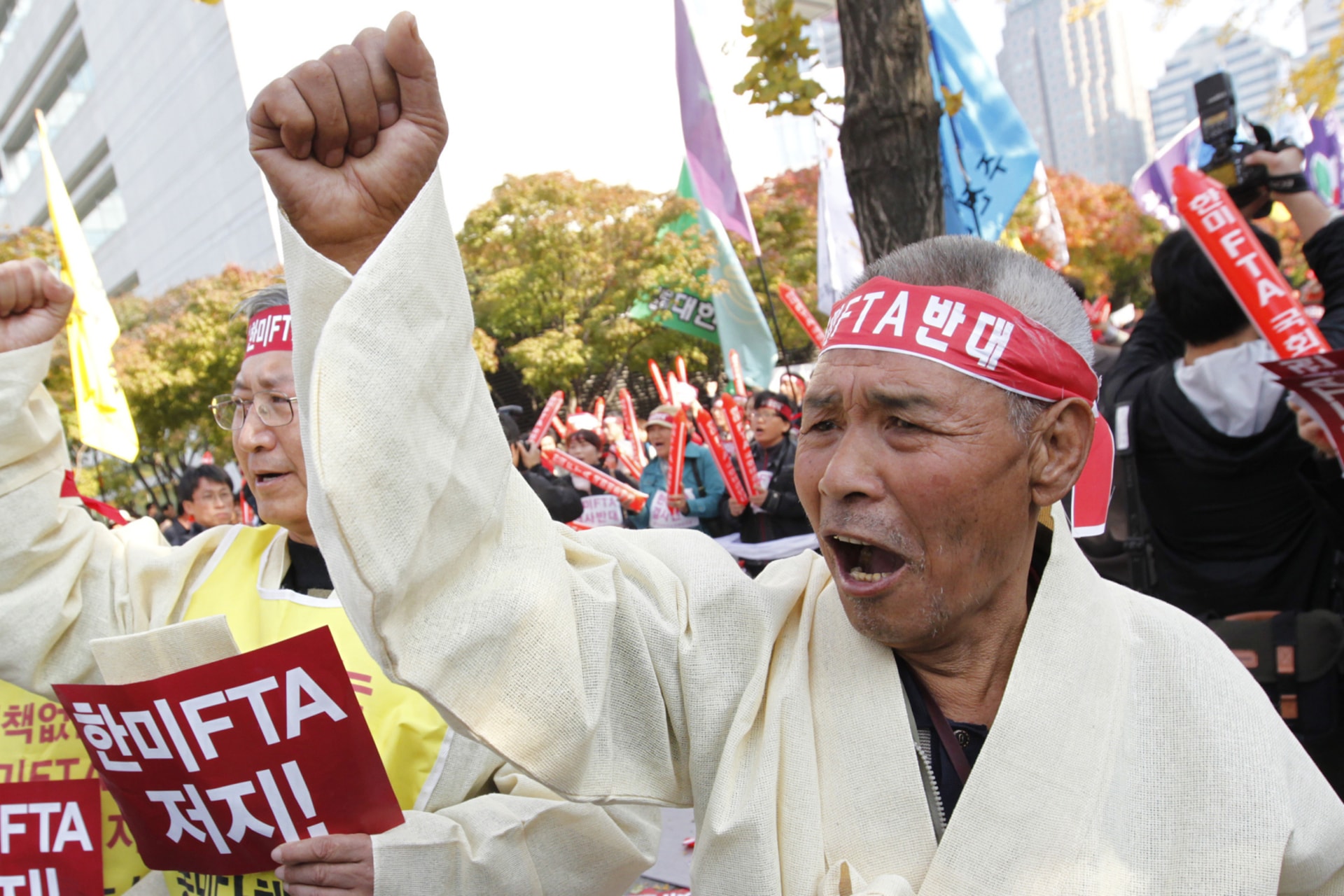How a Shift in South Korean Attitudes and Electoral Politics May Trip Up the KORUS FTA
Korea’s Election 2012: Public Opinion, Politics, and Implications for U.S.-South Korea Relations

BY
- Chi-wook KimAssistant Professor, University of Ulsan, Korea
The U.S. Congress approved the Korea-U.S. Free Trade Agreement (KORUS FTA) on October 12, 2011, but it remains deadlocked in South Korea’s National Assembly. Despite the Lee Myung-bak administration’s confidence that the trade pact will be ratified, it has become a political hot potato in Korean politics.
The current legislative stalemate seems quite puzzling in two respects. The first is that the debate has been concentrated narrowly on a provision outlining a process for investor-state disputes (ISD) settlement. The ISD clause allows U.S. investors to bring their disputes with the Korean government to an international arbitration panel instead of to a local court. Opposition parties including the Democratic Party (DP) claim that the clause favors Washington’s interests at the expense of South Korea’s sovereignty, and that it could derail the protection measures for local small-to-medium-sized firms and retailers, as well as local farmers. The ruling Grand National Party (GNP) defends the clause on grounds that it will not affect the autonomy of the government. The GNP emphasizes that the ISD clause was in the FTA text since the KORUS FTA was signed in 2007, and that its inclusion was endorsed under the leadership of then president Roh Moo-hyun and his party before it came to lead the opposition.
Figure 1. Koreans‘ General Attitude Toward KORUS FTA

Figure 2. Koreans‘ Attitude Toward KORUS FTA Ratification

A second puzzle is that consideration of the KORUS FTA has been accompanied daily by violent scenes and protests whereas the Korea-EU (KOREU) FTA, modeled on KORUS, was ratified without major incident. Arguably the KOREU FTA opened up the Korean market wider than KORUS in some industries, such as satellite communication and the environment. At the time of KOREU FTA ratification in May 2011, some lawmakers from the Democratic Labor Party resisted, but the main opposition Democratic Party simply abstained. As Figure 1 shows, Korean support for the KORUS FTA has been steadily over 50 percent, except in May 2008. However, those who favored KORUS ratification have been below a majority in most surveys (as shown in Figure 2). This suggests that the real problem is not the absence of support for the KORUS itself, but insufficient safeguards against negative effects of the pact.
These puzzles raise the question of why the KORUS FTA is so politically sensitive in Korea. Two significant changes in the Korean politico-economic landscape since the signature of KORUS trade deal that may explain this puzzle involve the current electoral cycle and an apparent ideational shift.
First, there has been a dramatic change in Korean electoral politics following the October 26 by-elections this year. As Scott Snyder noted in his recent essay on the Council on Foreign Relations (CFR) blog “Asia Unbound,” independent opposition candidate Park Won-soon won the Seoul mayoral race, which boosted the opposition and set back the KORUS FTA. The election result has allowed the opposition to feel more comfortable taking a hard-line stance toward KORUS ratification. Indeed, the Democratic Party published its own opinion poll on October 23, 2011, in which support for early ratification of KORUS was a mere 30 percent. Furthermore, Park won strong support from younger voters in their twenties to forties who have been the most critical of the KORUS FTA. According to a Realmeter opinion survey conducted on October 22, 2011, about 40 percent of respondents in their twenties and thirties opposed ratification of the renegotiated KORUS agreement, while only 34 to 37 percent were in favor of it. When asked about their support for the KORUS FTA process as a whole, 46.2 percent responded negatively (versus 38.5 percent), making younger voters far more negative toward the KORUS FTA than their older counterparts by margins of up to 30 percentage points. Thus, opposition parties hoping to capitalize on younger voters‘ distrust of the KORUS FTA ahead of next year’s general and presidential elections may present a daunting barrier to KORUS ratification.
Figure 3. Korean Opinion of National Policy Priorities

Second, there has been an ideational shift in South Korea since the 2008 global financial crisis, revealing South Korean judgments that neoliberal policies have failed. The experience of the crisis has undermined the economic rationale for FTAs in general and KORUS in particular. Korean public preferences have shifted in 2010 toward distribution and welfare over economic growth and the free market as a guiding principle of domestic political economy. Figure 3 shows that pro-growth discourse of the sort that President Lee has espoused had dominated the Korean national policy agenda up until 2009, but subsequently reversed itself. Respondents who favored policies designed to reduce economic polarization increased to 30.4 percent in October 2011 from 23.2 percent in December 2010. In contrast, support for economic growth as the top priority dropped from 19 percent in February 2011 to 14.6 percent in 2011. Despite the argument that the KORUS FTA would strengthen Korea’s security environment, the importance the Korean public has placed on the issue of national security has dropped in relative importance from 11.1 percent in December 2010 to 4.4 percent in October 2011. In sum, the foundations for the KORUS FTA such as income growth, international competitiveness, and security externalities have been seriously shaken.
President Lee’s “fair society” slogan has also inadvertently hurt chances for KORUS FTA ratification. Domestic supporters of FTAs with Chile and the United States emphasize positive first-mover advantages such as export growth and market shares. But the “fair society” discourse encourages people to ask who will benefit most from FTAs, and some have concluded that the main beneficiaries are the “1 percent” of the population represented by large conglomerates versus small and medium enterprises (SMEs) and local retailers.
The ISD clause had been taken for granted as a global standard by the majority of Koreans, a circumstance that explains why the provision was not controversial at the time of signing the KORUS FTA. But previously accepted global standards are now criticized for their association with financial failures that originated in the United States and the ISD provision—a signature component of the American FTA or bilateral investment treaty (BIT) model—has come under mounting criticism. A plurality (49.3 percent) of survey respondents view the renegotiated KORUS FTA as “humiliating” and as favoring U.S interests, whereas only 38.3 percent thought that it reflected “a range of interests.” Since Korea depends less on the European Union (EU) than on the United States, the issues involved with the United States are far more sensitive in Korean politics, heightening potential for public criticism of the KORUS vs. the KOREU FTA.
Rising nationalist sentiment associated with KORUS suggests that possible FTAs with neighboring East Asian economic giants China and Japan will be doomed as soon as they touch on issues of national sovereignty. Despite expected huge economic benefits from FTAs, historical and territorial disputes with China over its Northeast Project and Japan’s claim to Dokdo/Takeshima (also known as the Liancourt Rocks) will hamper any attempt to strike an FTA deal with South Korea. Korea’s FTA debate has become an illustration of the political limits on economic cooperation in East Asian international relations.t





